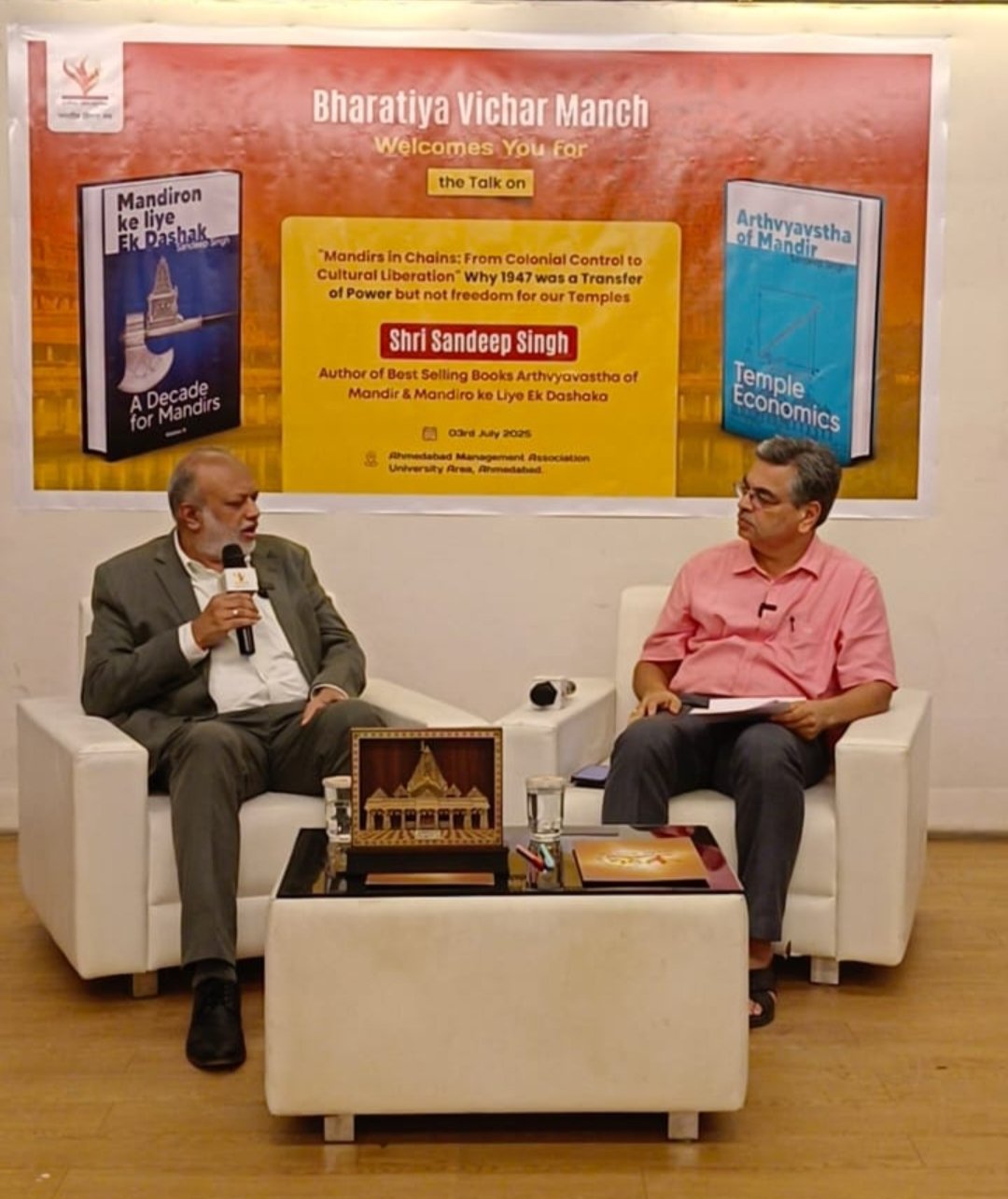Author Sandeep Singh advocates for Hindu awakening for freeing Mandirs in Chains at AMA
July 04, 2025
Ahmedabad: The Bhartiya Vichar Manch organized a dialogue on the theme “Mandirs in Chains: From Colonial Control to Cultural Freedom” on 03 July 2025 at the Ahmedabad Management Association. The keynote address was delivered by the best‑selling author of Mandir Economics and A Decade for Mandirs, Sandeep Singh who presented a rational perspective on cultural and intellectual colonization.
The speaker began by reflecting on the challenges faced during the global pandemic that began in 2020, referring to it as the “Chinese Virus.” He recalled how, amid a mass exodus of migrant workers from cities to villages, Mandirs across India opened their doors—providing shelter, food, and care without discrimination or publicity.
When asked by event moderator and NIMCJ Director Dr. Shirish Kashikar, “What is the true meaning of a Mandir?” Sandeep Singh replied that a Mandir is not just a place of worship but the home of the divine, where God is consecrated. He emphasized the need to stop using the term temple and instead retain the Indian term Mandir. He also challenged the phrase “Mandir economy,” insisting the correct term is “Mandir revenue” and that Hindus must understand this distinction.
Highlighting India’s spiritual unity, Singh noted that while Aurangzeb was destroying Mandirs in Kashi, people in Tamil Nadu were building Shivakashi. History bears witness to Hindu society’s resilience and collective efforts to protect and restore Mandirs—Ahilyabai Holkar being a timeless example of this devotion.
Describing India as the world’s only living civilization, he contrasted it with Egypt, where the pyramids remain as monuments but the knowledge to build them has been lost. In contrast, India continues to build Mandirs today—Ayodhya’s newly constructed Ram Mandir being a recent example.
Taking a satirical dig at the West, he remarked, “When Westerners call the coconut a ‘cannonball,’ can we really expect them to teach us values and civilization?” He further explained that Western scientific institutions, once church‑controlled, took 500 years to accept the concept of zero—an idea already embedded in Indian tradition. He pointed to the ancient “Zero Mandir” in Gwalior and the reference to the “South Pole” at Somnath Mandir as evidence of the deep links between Hinduism and science.
Raising thought‑provoking questions, he asked why there are policy think tanks like CII and ASSOCHAM for economic planning, yet no institution to guide Mandir governance. Only when the Hindu community awakens and gains the right knowledge, he asserted, can it engage meaningfully with the government on Mandir policy. Hence, he called upon Hindus to dedicate ten years to the service of Mandirs, transcending social divisions, and asserted that Mandirs have the power to unify.
Addressing concerns about corruption, he questioned the notion that if the government exits Mandir management, corruption will increase. “If nearly every government department struggles with corruption, should citizens take them over? Mandirs have stood resilient for thousands of years—even against invaders like Aurangzeb. The Hindu community is fully capable of managing its Mandirs,” he stated firmly.
Throughout his speech, he also recounted how Hindu families in Goa protected the sari—symbolic of Indian culture—during Christian colonial rule. He interpreted the Nataraja idol at Bharat Mandapam as a symbol of both creation and destruction, and concluded by urging society to rethink its blind adoption of the Gregorian calendar, which, he claimed, was developed by Christians who drew upon Indian scriptures to build their systems.
At the end of the session, the author of over a dozen books posed a powerful question to the audience: “When roads are in poor condition, you tag officials on social media, post photos of potholes, and make it a topic of discussion in every public forum—from elections to local gatherings. Then why is there no outrage within the Hindu community when it comes to the mismanagement of Mandirs and their revenues? If you don’t raise your voice, how will the government ever know?”
This thought-provoking program was organized by Bhartiya Vichar Manch, an institution that has been conducting impactful events on national and social issues for the past 34 years. The event aimed to raise awareness among citizens and witnessed participation from over 100 individuals, including Mandir trustees, families serving at temples, intellectuals, thinkers, and other distinguished guests.
Recent Stories
- BMW car catches fire near Vapi GIDC, driver escapes unhurt
- Heavy rains in Valsad leave national highways battered, drone video of vehicles jumping goes viral
- Watch | Locals rescue dolphin near Bhavnagar coast
- Gujarat leads in implementation of PMFME scheme with 675 beneficiaries: Govt
- VMC displays photos of litterbugs on LED screens to expose offenders
- Gujarat's largest Passport Seva Kendra opens in Bapunagar of Ahmedabad
- Vadodara youth dies after bike slips while trying to avoid stray cow
